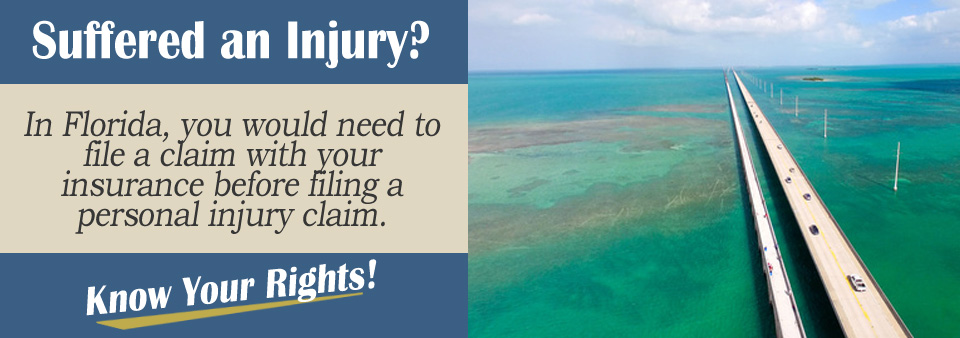Any person who has been injured in an accident in Florida that was not their fault may be entitled to file a Florida personal injury claim. There are all sorts of accidents that take place which cause personal injuries like auto accidents, slip and falls, motor cycle accidents, truck accidents and many more.
As long as you can collect together enough evidence that proves that the injury was not your fault but it was caused by someone else you may be eligible to file a personal injury claim in Florida which covers any financial hardship caused by the accident and injury. In Florida a successful personal injury claim includes the following:
- the cost of repairs to your auto (if applicable);
- any loss of wages while you are unable to work;
- an amount calculated that will cover the pain and suffering caused by the unexpected accident.
However, you may require some Florida personal injury help so that you can be sure you get the personal injury compensation you deserve.

How Do I File a Claim in Florida?
Before you have reached the final decision to file a personal injury claim you should be certain that you have enough evidence available to back up your claim which proves you weren’t the cause of the accident that led to your injury. You also need to consider Florida’s statute of limitations which is the time you are given to file a personal injury claim following your injury.
Under Florida's statute of limitations for personal injury cases, you have 4 years from the date of the accident to file a lawsuit in Florida's civil courts (this law can be found at Florida Statutes Annotated section 95.11(3)). If you do not file your claim within this timeframe, the court will probably refuse to hear your case.
How Do I Prove Negligence in Florida?
Proving negligence in a personal injury claim may depend on the evidence you are able to gather together which will work in your favor. There are several different types of evidence that can be used to back up your personal injury claim in Florida like:
- a medical report written by your physician which includes your diagnosis and expected recovery time;
- the police report written about your accident;
- oral and written accounts provided by eye witnesses;
- receipts showing medical treatment you have paid for so far;
- photos retrieved from security cameras close by, if possible;
- photos taken at the accident scene.
In a few personal injury cases, it may be argued, particularly by the insurer of the defendant that the person injured is actually to blame or partly to blame for causing the accident. Florida follows a pure comparative negligence rule and under this rule, the amount of compensation ("damages") you may be entitled to receive will be reduced by an amount that is equal to your percentage of fault for the accident. Courts in Florida are obligated to follow this rule in an injury case.
What Kind of Compensation Can I Receive in Florida?
There are two main types of damages that may be added to a personal injury claim. These are economic and non-economic damages. Economic damages can be calculated in cash terms and represents the money that the injured person has lost because of the effects of the injury or has to pay out due to the injury.
Economic damages may include the following:
- property damage;
- medical treatment bills;
- lost earning capacity;
- loss of wages.
Non-economic damages could include:
- disfigurement caused by the injury;
- emotional distress caused by the injury;
- inconvenience;
- loss of enjoyment of life;
- pain and suffering;
- physical impairment, like the inability to use a limb or organ.
Florida law on damage caps is generally only applicable to punitive damages. In most injury cases, Florida limits the award of punitive damages to 3X the amount of the compensatory damages, or $500,000 whichever is greater. Punitive damages are typically only available in a small number of injury cases. These damages are meant to punish the person found to be at fault for particularly dangerous or reprehensible behavior that caused your injury.
How Do I Get Personal Injury Help in Florida?
A personal injury lawyer should be contacted who may explain what rights you have to claim compensation and whether your case is sufficient to enable you to qualify for personal injury compensation. Your lawyer can, if required, act as your representative in court and speak on your behalf.
Most personal injury claims are settled out of court but if yours is complex the only way to resolve it and get your compensation entitlements is to take the matter to court. This is when you may need the most personal injury help you can get.
Fill out the Free Case Evaluation on this page to get in touch with an independent, participating attorney that subscribes to the website!